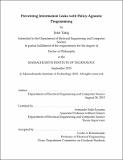| dc.contributor.advisor | Armando Solar-Lezama. | en_US |
| dc.contributor.author | Yang, Jean, Ph. D. Massachusetts Institute of Technology | en_US |
| dc.contributor.other | Massachusetts Institute of Technology. Department of Electrical Engineering and Computer Science. | en_US |
| dc.date.accessioned | 2016-03-03T20:30:24Z | |
| dc.date.available | 2016-03-03T20:30:24Z | |
| dc.date.copyright | 2015 | en_US |
| dc.date.issued | 2015 | en_US |
| dc.identifier.uri | http://hdl.handle.net/1721.1/101468 | |
| dc.description | Thesis: Ph. D., Massachusetts Institute of Technology, Department of Electrical Engineering and Computer Science, 2015. | en_US |
| dc.description | This electronic version was submitted by the student author. The certified thesis is available in the Institute Archives and Special Collections. | en_US |
| dc.description | Cataloged student-submitted from PDF version of thesis. | en_US |
| dc.description | Includes bibliographical references (pages 103-115). | en_US |
| dc.description.abstract | As a solution to the problem of information leaks, I propose a policy-agnostic programming paradigm that enforces security and privacy policies by construction. I present the implementation of this paradigm in a new language, Jeeves, that automatically enforces information flow policies describing how sensitive values may flow through computations. In Jeeves, the programmer specifies expressive information flow policies separately from other functionality and relies on the language runtime to customize program behavior based on the policies. Jeeves allows programmers to implement information flow policies once instead of as repeated checks and filters across the program. To provide strong guarantees about Jeeves programs, I present a formalization of the dynamic semantics of Jeeves, define non-interference and policy compliance properties, and provide proofs that Jeeves enforces these properties. To demonstrate the practical feasibility of policy-agnostic programming, I present Jacqueline, a web framework built on Jeeves that enforces policies in database-backed web applications. I provide a formalization of Jacqueline as an extension of Jeeves to include relational operators and proofs that this preserves the policy compliance guarantees. Jacqueline enforces information flow policies end-to-end and runs using an unmodified Python interpreter and SQL database. I show, through several case studies, that Jacqueline reduces the amount of policy code required while incurring limited overheads | en_US |
| dc.description.statementofresponsibility | by Jean Yang. | en_US |
| dc.format.extent | 130 pages | en_US |
| dc.language.iso | eng | en_US |
| dc.publisher | Massachusetts Institute of Technology | en_US |
| dc.rights | M.I.T. theses are protected by copyright. They may be viewed from this source for any purpose, but reproduction or distribution in any format is prohibited without written permission. See provided URL for inquiries about permission. | en_US |
| dc.rights.uri | http://dspace.mit.edu/handle/1721.1/7582 | en_US |
| dc.subject | Electrical Engineering and Computer Science. | en_US |
| dc.title | Preventing information leaks with policy-agnostic programming | en_US |
| dc.type | Thesis | en_US |
| dc.description.degree | Ph. D. | en_US |
| dc.contributor.department | Massachusetts Institute of Technology. Department of Electrical Engineering and Computer Science | |
| dc.identifier.oclc | 940778536 | en_US |
